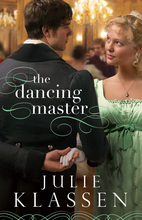 Julie Klassen's latest regency novel explores what happens when a young dancing master moves to a village where dancing is forbidden. Alec Valcourt and his mother and sister leave scandal behind in London, retreating to his uncle's home in the small Devonshire village, where he encounters Julia Midwinter, the defiant and flirtatious daughter of the local gentry. Julia would love to learn to dance, or do anything her mother has forbidden for that matter, and so she is intrigued with the new dance master who finds himself as a clerk in her household. Old secrets and scandals in her own family continue to put her at odds with her mother, who essentially controls the village. Will Julia make peace with her mother? Will Alec be able to care for his family in a place that forbids his profession? And is there a way that a mere dancing master could ever hope to wed the daughter of the gentry?
Julie Klassen's latest regency novel explores what happens when a young dancing master moves to a village where dancing is forbidden. Alec Valcourt and his mother and sister leave scandal behind in London, retreating to his uncle's home in the small Devonshire village, where he encounters Julia Midwinter, the defiant and flirtatious daughter of the local gentry. Julia would love to learn to dance, or do anything her mother has forbidden for that matter, and so she is intrigued with the new dance master who finds himself as a clerk in her household. Old secrets and scandals in her own family continue to put her at odds with her mother, who essentially controls the village. Will Julia make peace with her mother? Will Alec be able to care for his family in a place that forbids his profession? And is there a way that a mere dancing master could ever hope to wed the daughter of the gentry?Like all of Klassen's regencies, this book is well researched. Besides the obvious dancing and fencing aspects (like any good dancing master, Alec teaches fencing as well, since one helps with the footwork of the other), the author also includes traditions of Devonshire from villages around where this story is set. It was also interesting to have a glimpse of the practices surrounding adoptions in those times. Klassen does an excellent job of incorporating aspects of life that we frequently see and yet rarely consider in a historical light (like adoption, or autism in her previous novel The Tutor's Daughter).
For easily the first half or more of the book, I just did not like Julia - her selfishness, flirting, falsehoods, and immaturity grated. However, I could see where she is coming from: she is acting out to gain attention and love deprived her by her father. It happens in real life, but it is not particularly fun to see or read about. What she really needs is a good spanking, and while that form of discipline does not befall her, she does at least receive a wake-up call. She improves later in the story, but I would have liked to have seen appreciable change much earlier on.
Like Klassen's other works, this was a thick, meaty novel to devour, perfect for an indulgent day of reading. While I was uncertain for a while if it would have much of a spiritual message like her other books, she did eventually hone in on God the Father's perfect love. The mother-daughter aspect of the story was also good; so often parents are given superficial parts in fiction, if they exist at all, but Julia's mother was a well-fleshed character, and I thought of her as almost a secondary heroine - imperfect by far, but all the same a woman to root for. For me, her faults were a bit easier to take than Julia's, which I found to be the main sticking point of the novel. Over all, though, it was another good read by an excellent author! 4 out of 5 stars
Thank you Bethany House and NetGalley for providing me with a free e-copy for the purpose of review; I was not required to make it positive, and all opinions are my own.
No comments:
Post a Comment